Barbara Graf (Bärbel) – Vienna to Vienna
Bicycle trip around the world with crossing the oceans on a sailboat – freegan
Austrian – born 1987
3 years and 8 months on the road – maybe about 22.000 km by bicycle and another 19.000 by sailing boat – 29 countries.
Riding my bicycle it was not important “where to” but “how to” – I never much cared about the destination – but about how to be living this life on the road, travel sustainably, use my own power, be autonomous. It’s about cooking “one-pot-meals” on my campfire, stuffing myself with wild mulberries, being invited for tea, making friendship with people I meet, finding funny shelters, recycling and reusing things, fixing my bike on my own and feeling comfortable in the darkness of the forest.
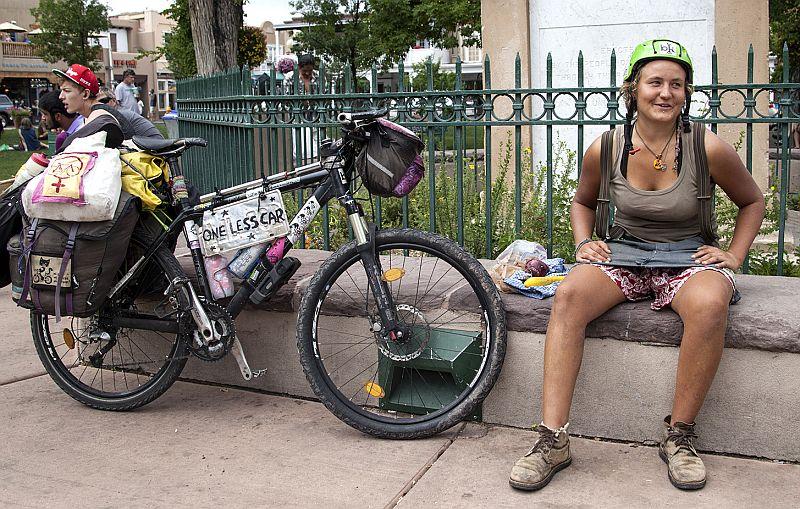
Picnic. Santa Fe in New Mexico. A student in photography asked me for this picture / USA August 2012 /Photo Jordan Haiduk
1. Why did you cycle around the world?
It wasn’t actually planned like this. It happened when I was on the road. I knew I would be gone for long, but I didn’t know where I was going nor did I really care about the destination. I think a good experience can happen anywhere! Travelling – for me – is less about sight-seeing or stunning landscapes, but about what happens while being a traveler, about learning to consciously experience and enjoy the adventures and encounters of daily life on the road.
So first of all there was no destination. I started off towards South-West Europe because it was fall and therefore getting cold in Central Europe. Only when I was in the USA and had made it all across to the Westcoast I thought it would make more sense to continue „forward“ sailing west, across the Pacific and riding across Asia rather than going „backwards“ sailing across the Atlantic. So that’s when I thought – okay let’s make it „around“.
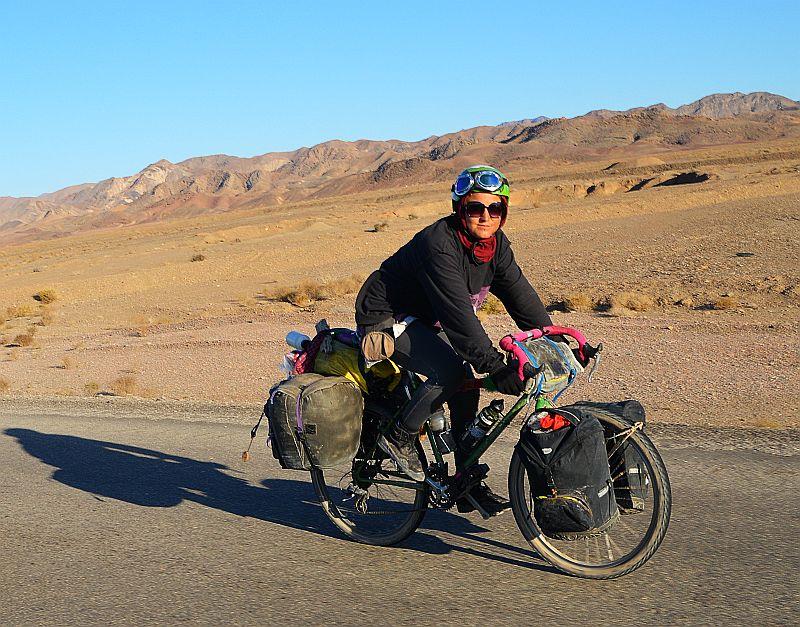
— Across the desert / Iran December 2014 / Photo Astrid —
2. While cycling around the world you never used an aircraft. How did you manage to cross the oceans on a ship? How long did it take and how much stress and money were involved in traveling this way? Was it an adventure in itself?
I was born in a country surrounded by mountains. Before my trip I had almost never spent a thought about sailing boats. The idea that people live on and travel by small yachts even across big oceans was out of my imagination. It only came to my mind, when I was wondering about how to get across the sea without an airplane. I had given up on flying about 10 years ago as a response to climate change and direct action against the destruction and exploitation of ecosystems, habitats and local communities.
So I decided that I would only go to another continent, if I could make it in a more sustainable way like by boat. So when I arrived in Gibraltar I took the chance to go and see if I could manage to hitch-hike across the Atlantic. In one of the marinas there I got lucky. A German „single hand sailor“ agreed to take me to the next islands – the Canaries. From there I got another ride with an English guy who took me and my bike all the way across the Atlantic to the island Martinique. It kind of all worked out by chance.
If I wouldn’t have found the first boat I probably would have continued by land – maybe towards Portugal. But now I was in the Caribbean and had crossed already one ocean, so I decided to keep on going west. Later I ended up travelling on 7 more boats during my entire trip. The longest and hardest passage was the one across the Pacific Ocean. We were 4 young people on a 30feet boat for 5 months. From the USA to Mexico and to the South Pacific Islands. Once we were at sea for 24 days without seeing any land. It was a huge adventure. And I was badly seasick most of the journey. Nevertheless I never missed any of my shifts during which I had to be steering and watching the boat while the rest of the crew were sleeping.
Many times it wasn’t so easy to find a boat. This also depended on the sailing season because sea- passages can’t just be done at any time during the year. For example the cruise from Australia to Indonesia or from Europe across the Atlantic is best only between 3-4 months of the year where the winds and currents are in favor and the passage at lowest risk. Having to always keep in mind being at the right time in the right place to be able to catch a crew position across the next ocean definitely added some stress to my journey. Even when I made it to that place it still wasn’t certain to find a boat who was willing to take me and my bicycle on board. Sometimes I had to spend several weeks – in Cuba and Australia even months – putting up notes in every marina, talking to all the sailors in the harbor and the nearby bars or search several online „crew finders“ for any offers until I would find the right boat and people.
In terms of money every deal was different. In any case it was always cheaper and of course more exciting to sail rather than taking a flight. For most of the passages I didn’t have to pay more than my share for the provisions. As part of the crew I then had to do my shifts like watching out and steering the boat, cook, clean and navigate. On some passages the captain didn’t let me do anything but treated me just like a guest. On other passages I was taken especially to support the crew and was even paid all the food. On another journey we all shared all work and put together our money for food, water, fuel and marina costs for the times we had to stay in harbors instead of anchorage.
After all I have to say, that even if I was so badly sea sick, sailing was one of the most fascinating parts of my journey and a big teacher showing me that other ways are practically possible.
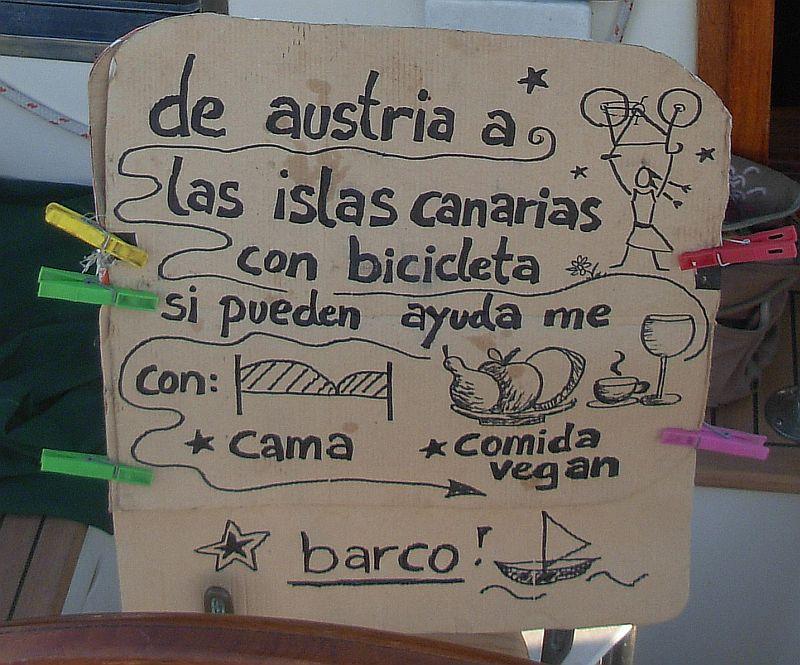 — I used this sign to find my first lift on a sail boat / Spain January 2011 —
— I used this sign to find my first lift on a sail boat / Spain January 2011 —
3. You had a guitar with you. Did the music help you to get a better contact to the locals?
Yes! It was always fun when I took out the guitar. Especially the kids really liked it. It wasn’t even necessary to be playing very well. Once I spent 2 days on a local ferry from Indonesia to Singapore where I obviously was the only „foreign“ person in the middle of a whole floor of young men.
My guitar was the perfect „icebreaker“. It didn’t take long until I was friend with them and soon every day even guys from other decks came over for a music session at my mattress or to borrow the guitar.
In some touristic places I also used the guitar to make street music and earn a little pocket money. I only knew how to play a few songs but with the sign „around the world by bicycle and sailing boat“ leaning next to my heavy loaded bike I was attracting lots of attention and in the end always had a few coins in my hat.
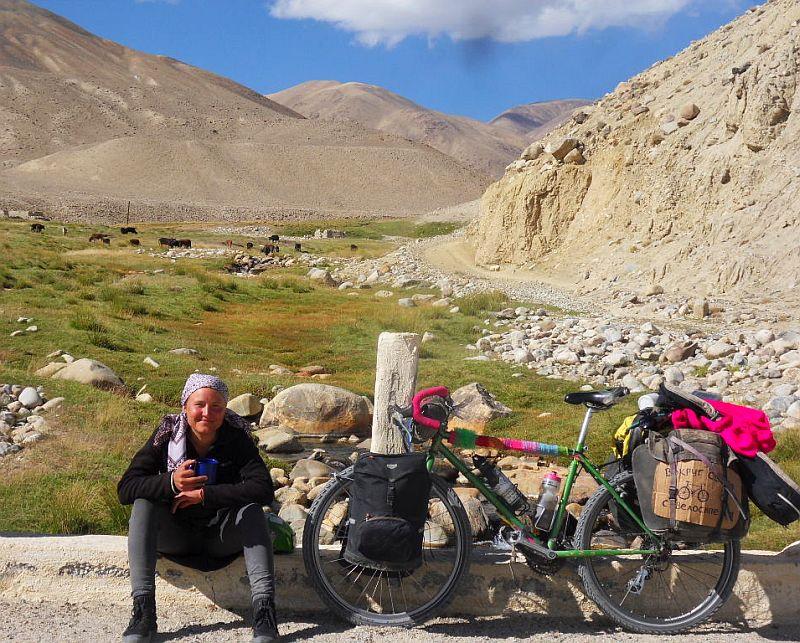
— Break in the Pamirs / Tajikistan October 2014 —
4. Your choices for camp sites are quite different from the average cycle tourist, can you tell us something about it?
For me this is really exciting! Finding places to sleep was a big part of my adventure. Sleeping in hotels for me is boring. That’s not why I went travelling. And for sure I would not have been able to go travelling like this – having first to spend many years of hard work in order to save up the money for such a trip.
It’s a great experience to practice extending my personal comfort zone step by step. It’s beautiful to learn to trust, that I would always find a place, even if I had to ride through the whole night, or if I would get wet and cold – my experience was that always at one point the sun would shine again, I would find an empty building I could squat, or a railway bridge to sleep under or meet people who would wave me into their warm hut and invite me for tea.
Once I had sharpened my eyes for it, the world seemed full of exciting hidden camp spots.
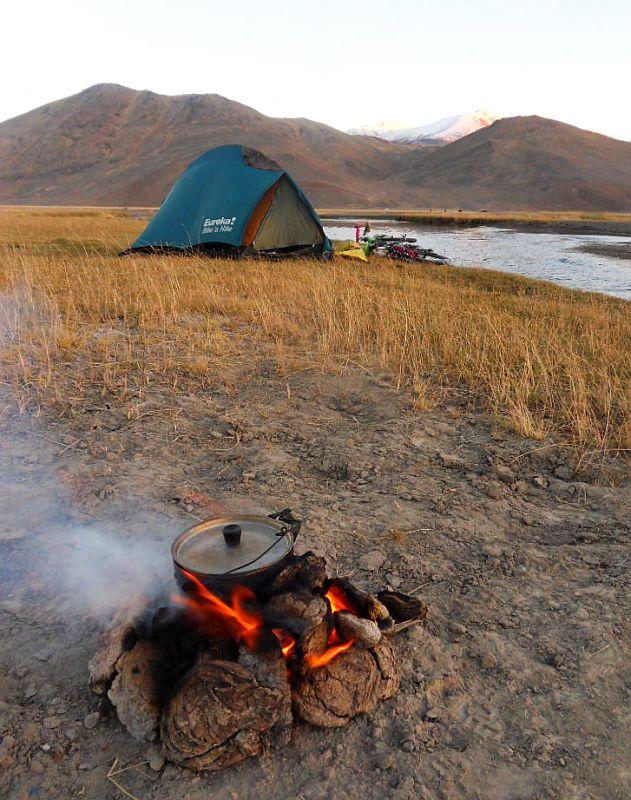
— Pamir / Tadjikistan October 2014—
5. You call yourself a freegan. What is freegan? How did being a freegan affect your life on the road?
Freegan is just one possible term or aspect to describe a life-practice, which tries to deal with the common structures of the dominating system and break with them. The term describes people who, mostly because of political reasons, consume vegan but also in general disagree with capitalistic and exploitative structures and want to fight them. It’s not only about minimizing the harm on animals through a vegan diet, but also for example about not to support big corporation and instead recycle the „waste“ which these supermarkets produce in tons every day.
The term „freegan“ is put together from the words „free“ (no costs) and „vegan“.
For me freegan is a practice, which doesn’t always mean that the same actions make sense for any place and situation. I personally try to avoid buying and consuming animal products.
On my journey I collected lots of fruits, nuts and herbs from the side of the road and recycled food from the dumpsters of the supermarkets that I passed by -„dumpster diving“. Among all the so called „trash“ I sometimes also find dairy products like cheese or joghurts, which I would not buy but only eat them when recycled.
When I was travelling across the oceans I even started to fish, because looking at the bigger picture I found it made more sense and had less impact then having to provision with lentils in cans or tofu in plastic from multinational corporations like Walmart. Considering this – I even became a hunter for this short period.
Another situation where I found my veganism wasn’t at the right place, was when I was travelling through areas like Tibet or Central Asia, where at times there were almost no fresh fruits or vegetables to find and where the locals depended on their animals. In this regions I often decided to just thankfully take the offers that were gifted to me and even tasted yak milk and fermented horse milk. Meat I was mostly able to avoid.
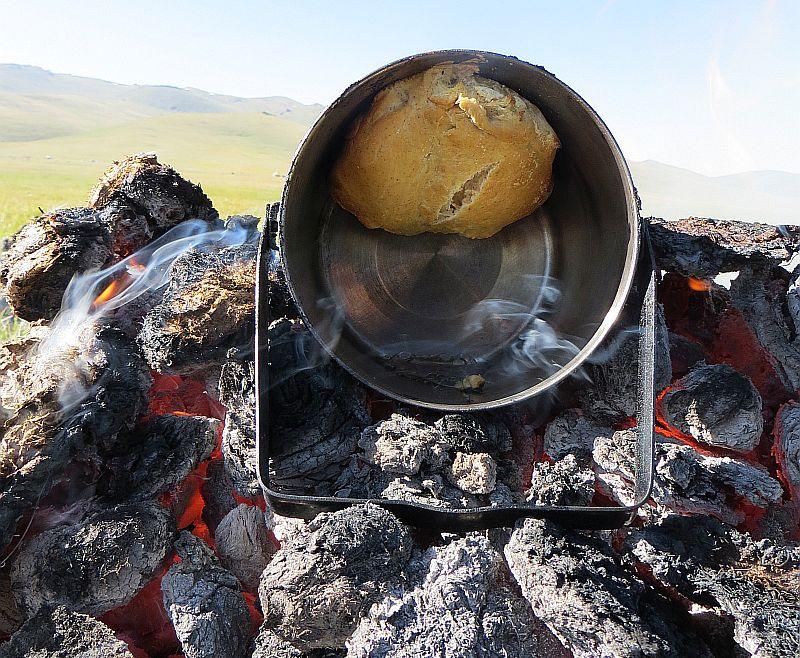
— If there wasn’t any wood, I made my fire like the locals with animal pooh. We could even bake bread on the so called shit fire. Kyrgyzstan September 2014 / Photo Ania —
6. Now and than you cycled with others. Did they adapt to your lifestyle?
Yes a little bit for sure – even though we always tried to find a way to combine our different styles of traveling and our personal expectations. Sometimes it’s actually really nice and funny to be inspired by the habit and way of travelling of somebody else. Some fellow travellers found it exciting to go
dumpster diving with me, harvest wild fruits, sundry veggies or make shit-fires from yak-pooh and bake bread on them.
I myself was inspired by others for example to hitchhike on sailing yachts, to carry sourdough in a jar, use water and „pee rag“ instead of buying and carrying toilet paper or to always take enough drinking water and also to enjoy places like the Turkish Hammam, which by myself I would have left out.
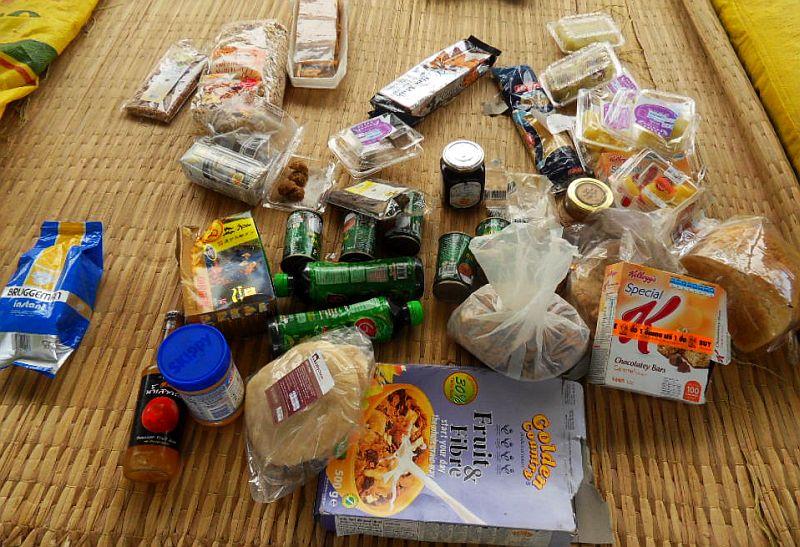
— Dumpster diving in Chiang Mai / Thailand March 2014 —
7. You cooked very often on an open fire and didn’t have a stove with you. How did you then cook in cities, in areas without trees and when it rained for several days?
I love fire and wilderness skills. Somehow I found it weird to consciously travel by using less fossil energy sources and then carry a fuel- or gas-stove to cook my daily dinner. I preferred to cook directly on a wood fire if I wanted to eat warm food. And I got quite good in it ; )
I still remember a situation, when some fellow travellers we had met, could not imagine how to make a fire with this little burning material around. It was my friend Ania who responded: „No worries – Barbara can make fire from anything“. This made me giggle and, I admit, a little bit proud as well. I was happy that with some practice even in quiet wet conditions I was often able to find something that would burn.
If and where I cooked often depended on phases and places. When in some areas it was rather difficult to make a fire at night because I wanted to stay hidden and didn’t want to draw so much attention to me I got used to cook at noon somewhere at the side of the road. When I was higher than the trees grow, I learned from the locals and used sundried animal-pooh to light my fire. I called it „shit-fire“and was really excited about how great it worked.
Sometimes when I was in big cities I was also staying with people who had a fire-place or a stove where I could cook. And if for some days I had to eat cold it wasn’t any problem for me either.
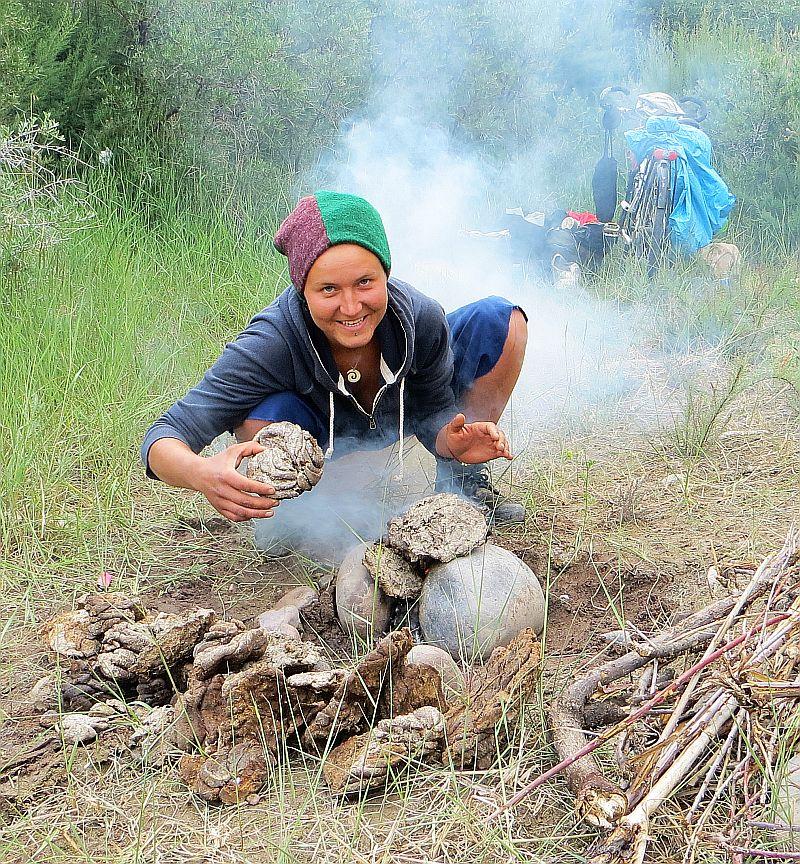
— shit fire —
8. You are wearing old style aviator goggles? Is there a story behind them?
These goggles I found in a „free box“ of a collective house in Oakland CA, where I was staying as a guest. Just like most things I needed during my trip I either found them, was gifted something or made it myself. Almost all my gear was secondhand.
Monetarily these things have not a lot of value, but they are still practical and every piece has its story. I like these stories a lot. They remind me of places, encounters and certain times of my life and journey. It also showed me that so much of what we need somebody else doesn’t need any more
and wants to get rid of. Therefore the idea of free-shops or boxes is to create a space, where people can bring and take things without exchanging money. For a traveller this is especially handy. When after a cold winter I was riding into summer, it was great to give away the warm pullover and get a t-shirt instead, or leave my old maps for the next traveller.
Other places I often liked visiting were „self-organized free spaces“ and workshops, which don’t work on profit but on solidarity and sharing. In one of these DIY (do it yourself) workshops I learned step by step to build up my own „new“ bicycle all from used parts. And when my old and worn out panniers, which my parents had already used for many years, finally broke, I was happy to find an
open art collective, where I was welcome to use the communal sowing machine free of charge. With some old jeans and canvas fabric I found there, I was able to fix myself „new“ panniers which I made water resistant with melted beeswax.
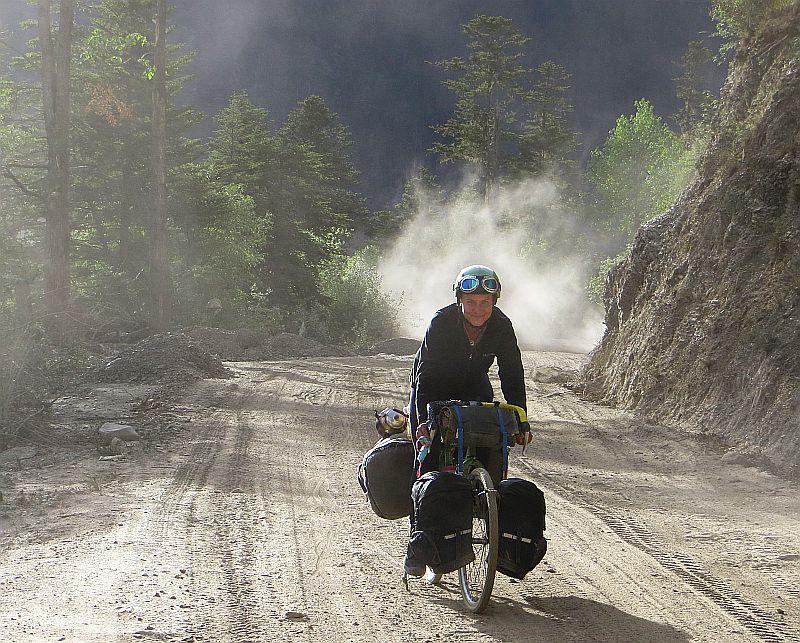
— On steep gravel roads in Sichuan / China May 2014 / Photo Ania —
9. When you were within 1000 kilometers of returning to Vienna, what were your fears and what did you most look forward to?
Very consciously I have been experiencing these last kilometers. And with lots of gratefulness. Enjoying my nightly fires and wild fruit picnics on the side of the road with a little bit of nostalgia – remembering the first kilometers and how it had all started. I spent much time reflecting the last 3 and a half years and thought about what I have taken with me for my life from this time.
I also thought a lot about the future, wondering and imagining what I would do next. And I was a little bit frightened – fearing to experience what many travellers experience when they finally come home – that after the first high-time I would fall into a depressing phase.
Still I was looking forward to coming back and actually kind of trusted in me. After I had met so many challenges I thought I will also handle this one. And I was so looking forward to see my friends and family after all! – and about getting settled!
I was especially excited about being able to connect with people and involve in projects for long term and to have again relationships which last longer and can grow deeper.
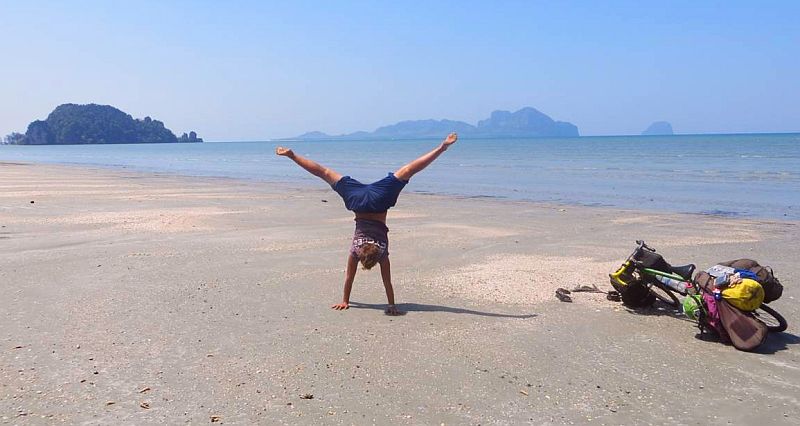
— At the beach / Thailand March 2014 / Photo Ania —
10. Please describe your 3,5 year long world bike trip in 10 sentences.
I went on this journey by bicycle and sailboat-hitchhiking, because I don’t want to support or promote flying around for fun while the ones who aren’t free to move are the most effected by climatic changes caused by burning tons of fossil fuels to the air…And because of my passion for cycling and the feeling of autonomy it gives to me.
Instead of any specific plan for a destination – my plan was to practice DIY (do it yourself) on the road while visiting collective projects and learning more about how we can live community- and land based.
I was mostly happy travelling alone – but always excited to meet a cycle-sister and travelling together for a while.
I wasn’t sponsored by any corporation but supported by many ordinary people. It was these people and the land, who carried me along my journey – offering me food, water, shelter and beautiful encounters.
Interested in getting to know the people’s daily life and struggle, I was always more excited to be invited at the table of local people then visiting the temples, graves or palaces.
What I loved as well: was to cook one-pot stews on my campfire, cycling downhill screaming out of happiness, to swim in freezing waters and be holding the tiller of the little sailing boat in a starry night on the pacific, while my three fellows were sleeping down below.
What made me angry: the concept of borders, states and creepers. But at least they encouraged me to kick their asses and to solidarise with the people not with the system they are oppressed by.
Creeper: (A word I developed with my cycle sisters for men that act invasive and abusive) for example verbal sexual harrassment, groping, sexist remarks and extrem paternalistic behaviour (paternalistic protector syndrom, which is characterised by exaggerated and excessive help) as well as taking tools and bikes from our hands.
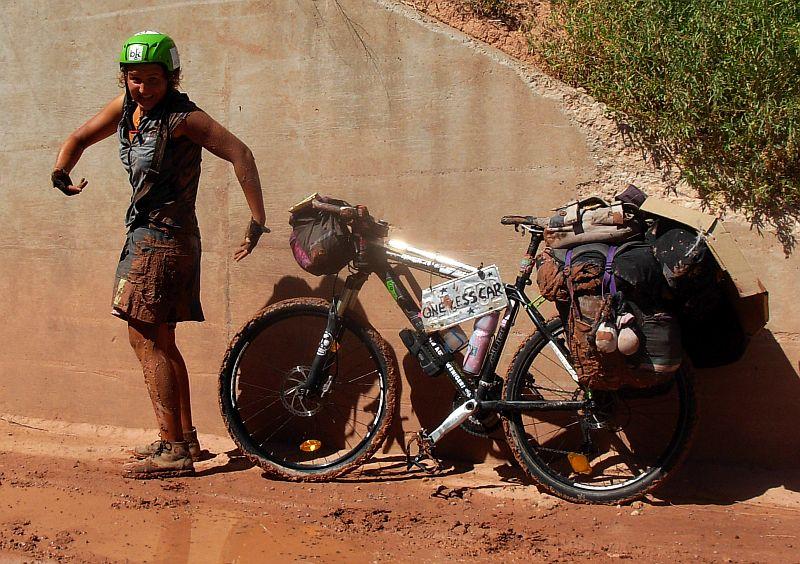
— mud bath in New Mexico / USA August 2012 —
11. Now that you have been back home for nearly a year, do you have the feeling you are able to live the life you had before your trip? Or has life changed and if so how?
Yes and no; I am now slowly starting to get used to being back here. Still everything is different. And that’s somehow beautiful. I am settling – not into my old life but for a new one. Even though I found a job (delivering food by bicycle) and – at least for the winter and spring – was living in a warm flat, I don’t feel like my adventure is over. It’s the opposite – another adventure has started!
The insights and experiences of my journey have encouraged me to go and find other ways. This is what I still want to do – these days by growing roots.
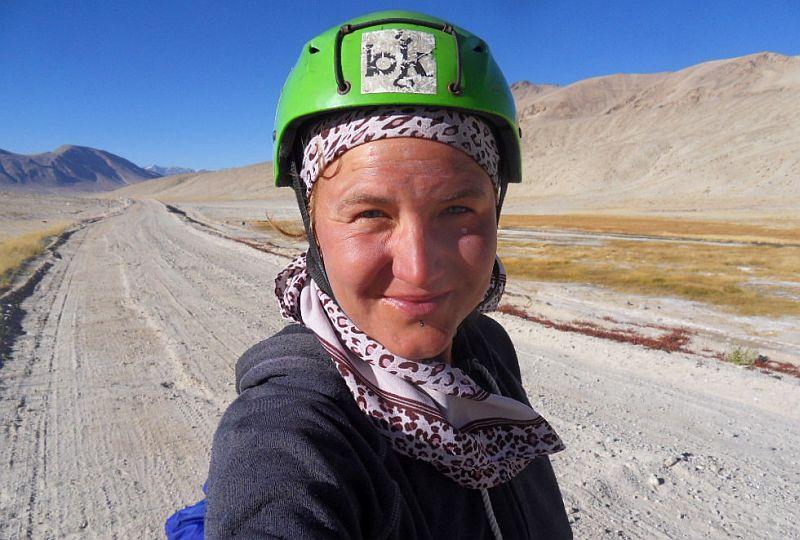
— Pamir / Tajikistan October 2014 —
Find out more about Bärbel on her blog: http://caretaker.cc/barbels-blog/philosophy-of-the-journey/
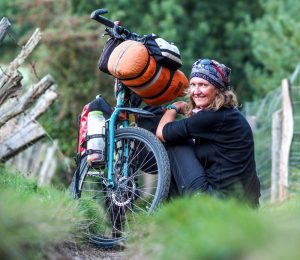


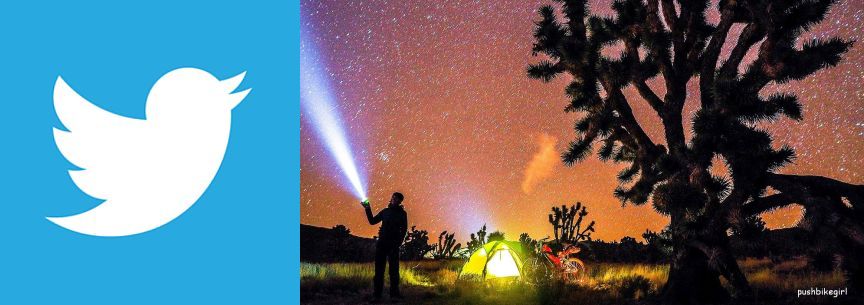

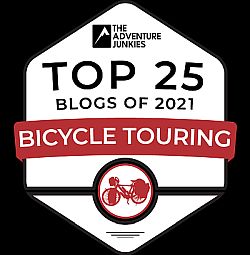
0 Comments